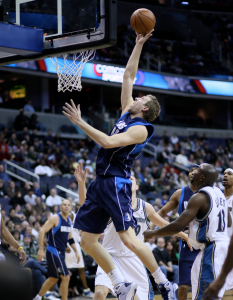The NBA announced last Monday they had reached a groundbreaking deal with ESPN and Turner Sports that is going to fundamentally change the business side of the game and the way fans watch the sport. This $24 billion deal spans nine seasons beginning in 2016 and constitutes a nearly 200 percent increase per season from the 2007 deal. While many people were expecting a large deal, one of this magnitude is going to blow the lid off the league’s finances and ultimately contribute to the fight over net neutrality.
This momentous contract has considerable pecuniary ramifications for the league owners and players. Since about half of the NBA’s basketball related income is allocated to the players, team and player salary caps are going to skyrocket. A player like LeBron James will be eligible to make nearly $30 million a year, about $8 million more than he currently makes. This is why, in anticipation of a substantial deal, he decided to only sign a two-year contract with Cleveland, permitting him to re-sign for that extra money in a more conventional four-year contract when this new blockbuster deal takes effect. The anticipation for the league’s extra cash has led many to speculate the possibility of another NBA lockout due to the likely tense negotiations over how this money will be factored into salary caps. Many expect a graduated system that phases in the extra money over time, but debates over the degree of salary cap smoothing could lead to a power struggle between the league and players. However, since the deal was so much larger than anyone expected, there may just be enough money to go around to make everyone happy.
The humongous influx of money is a product of ESPN and Turner Sports’ confidence that many fans are  deciding to live stream games, a turn away from the traditional construct that requires one to have a cable contract to view any game. There will likely be a new Internet and mobile streaming service separate from the already existing WatchESPN that will allow customers without cable to view nationally televised games more easily. This new exclusive contract will enable Disney and Turner’s subsidiaries (ESPN, TNT, ABC, etc.) to essentially lock out other networks like Fox, creating a stranglehold on the hottest NBA games — like the playoffs — which will only be aired on these networks. Sports games remain one of the few television programming areas that are always in high demand. With the advent of Internet streaming and DVR, advertisers have trouble connecting to potential consumers during other kinds of programming, but sports games still have a dedicated following of live viewers, which prompts advertisers to pay big money for these prime commercial locations. ESPN and Turner are counting on this extreme demand for prime advertising space since they are sinking so much money into the deal.
deciding to live stream games, a turn away from the traditional construct that requires one to have a cable contract to view any game. There will likely be a new Internet and mobile streaming service separate from the already existing WatchESPN that will allow customers without cable to view nationally televised games more easily. This new exclusive contract will enable Disney and Turner’s subsidiaries (ESPN, TNT, ABC, etc.) to essentially lock out other networks like Fox, creating a stranglehold on the hottest NBA games — like the playoffs — which will only be aired on these networks. Sports games remain one of the few television programming areas that are always in high demand. With the advent of Internet streaming and DVR, advertisers have trouble connecting to potential consumers during other kinds of programming, but sports games still have a dedicated following of live viewers, which prompts advertisers to pay big money for these prime commercial locations. ESPN and Turner are counting on this extreme demand for prime advertising space since they are sinking so much money into the deal.
Net neutrality will also factor into this new method of watching sports. If Internet service providers (ISPs) are able to charge based on content, watching these games will be harder to do, which will ultimately be a lose-lose for fans and networks. Still, ISPs will not be happy with television networks cutting out the middleman and making an unbelievable amount of money while they can only collect monthly subscriber fees. This megadeal rattles the cage of the ongoing net neutrality debate, pitting large sports and television companies against powerful ISPs. As the regulatory battles over net neutrality rage on, the NBA television deal serves to dig even deeper trenches.
Ultimately, the NBA’s multi-billion dollar deal with ESPN and Turner Sports signifies an ongoing shift in how fans watch basketball in today’s society. Internet streaming, and a swing away from cable, have allowed ESPN and Turner to try to seize the momentum and capitalize on precious advertiser money in one of the most sought after categories, creating a potential adder’s nest in the fight over net neutrality. In the interim, this inflow of money will greatly expand player and team salary caps, negotiations over which could potentially lead to another disappointing lockout. Nonetheless, as it stands today, the NBA, ESPN and Turner Sports have all won, and NBA fans can look forward to a new era in the game.
